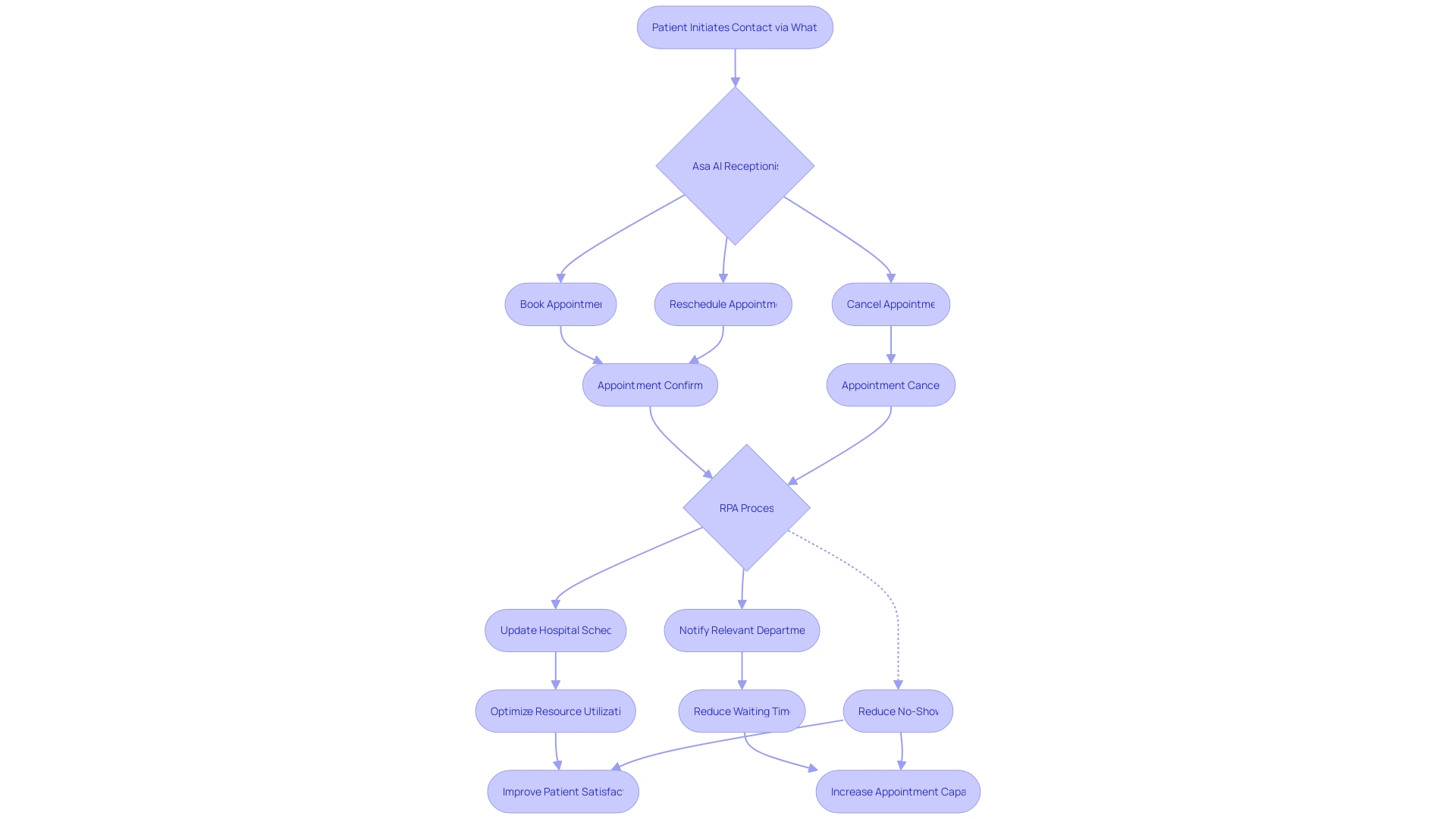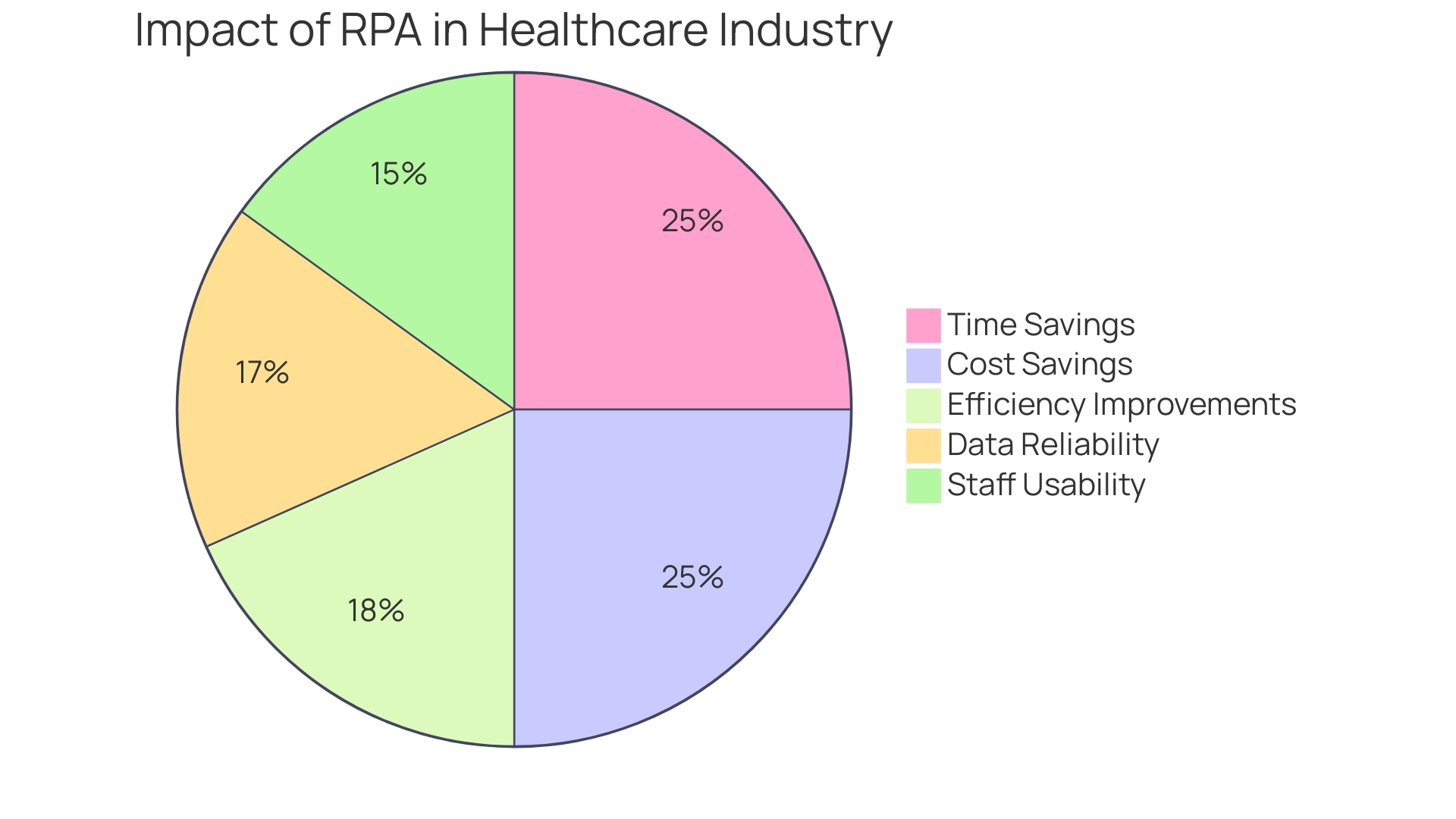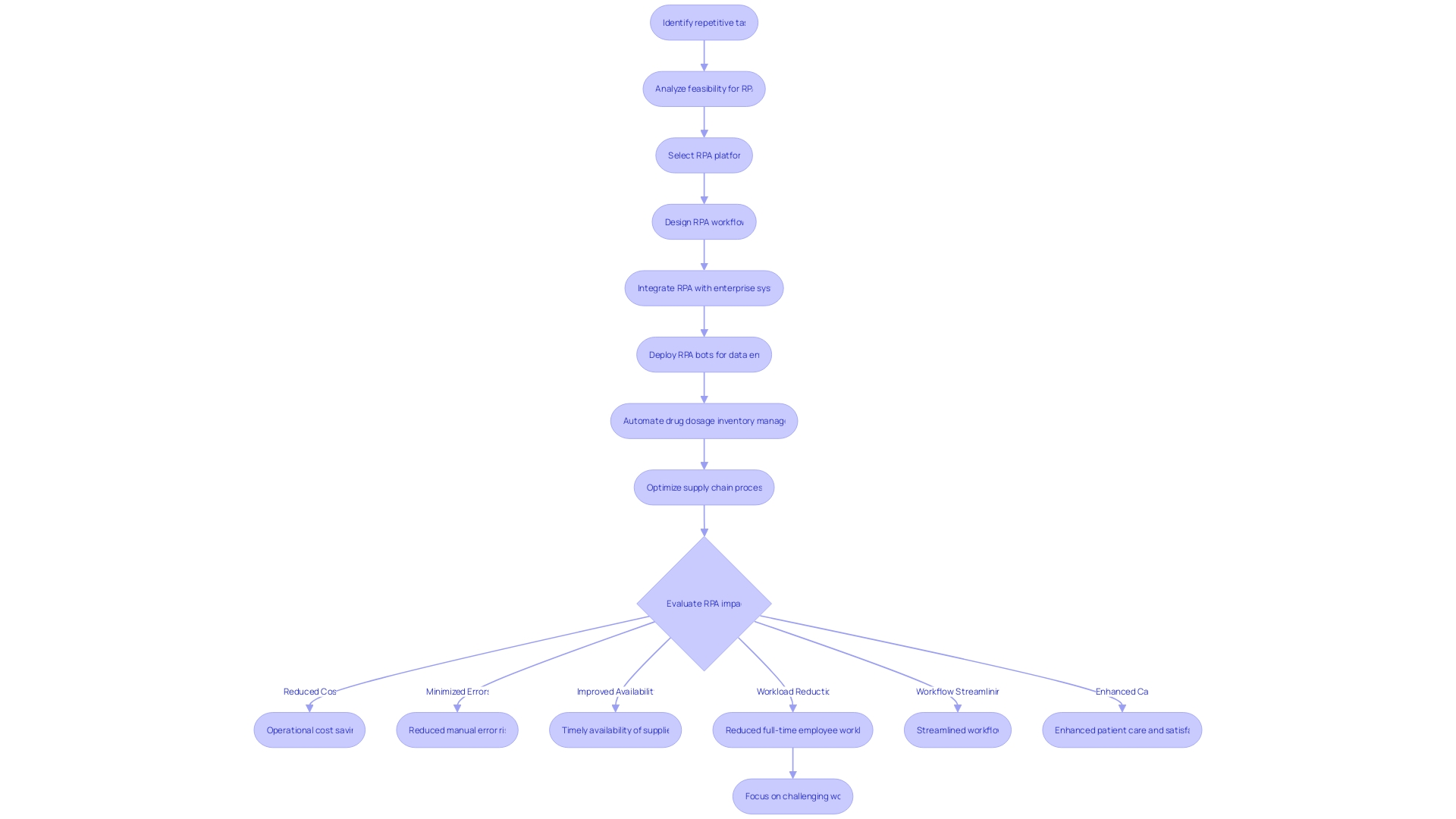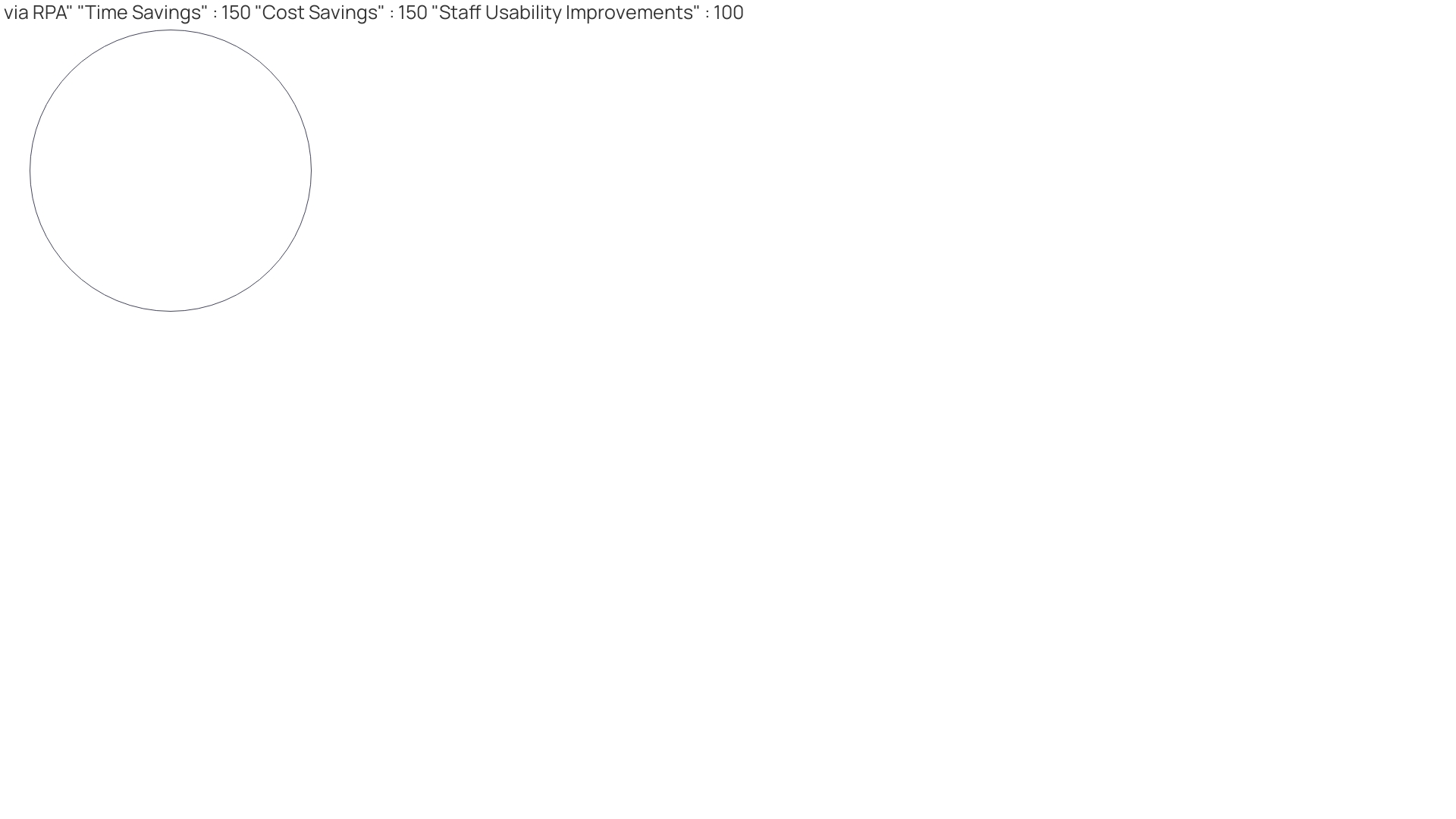Introduction
Robotic Process Automation (RPA) is transforming the healthcare industry, revolutionizing various aspects of healthcare management. From Electronic Health Records (EHRs) to appointment scheduling, billing and claims management, patient data analysis, supply chain optimization, and post-treatment care, RPA is streamlining workflows and enhancing efficiency.
This article explores different use cases of RPA in healthcare, highlighting the benefits and measurable returns that organizations can achieve by adopting this technology. With its ability to automate mundane tasks, improve data reliability, and empower healthcare providers to deliver superior patient care, RPA has become an indispensable tool in the industry's arsenal. Join us as we delve into the transformative power of RPA and its impact on the healthcare landscape.
Use Case 1: Electronic Health Records Management
Robotic Process Automation (RPA) is revolutionizing the management of Electronic Health Records (EHRs), streamlining workflows to ensure accuracy and efficiency. By adopting RPA, healthcare providers can automate mundane tasks like data entry, which are prone to human error and consume considerable time. For example, LLR PCL faced a laborious process using paper forms and Excel for Infection Prevention & Control Auditing, which resulted in substantial time expenditure and increased risks of data loss.
Implementing RPA, they transformed their operations, enabling seamless tracking of Key Performance Indicators (KPIs) and reliable incident reporting without the redundancy of manual data logging. The benefits are clear, with organizations like Surgery Partners saving over $150,000 annually by eliminating repetitive manual data entry, thus allowing their workforce to engage in more meaningful tasks. This not only improves employee satisfaction but also enhances the quality of patient care.
In fact, RPA's ability to work across various platforms and systems makes it an invaluable tool in the healthcare industry's arsenal, offering increased data reliability and ease of use for staff. Furthermore, the strategic use of RPA has a direct impact on the healthcare revenue cycle by accelerating claim processing and optimizing overall efficiency. With the healthcare landscape rapidly evolving, automation technologies like RPA that harness AI and Machine Learning are no longer luxuries but necessities, empowering organizations to deliver superior patient care while improving financial performance.
Use Case 2: Appointment Scheduling and Management
Innovative use of Robotic Process Automation (RPA) in healthcare is revolutionizing the way patients engage with services, particularly in appointment management. A notable implementation is the NHS's pilot program in North Central London, where an AI receptionist named Asa is being utilized to facilitate cervical cancer screening appointments.
This AI-powered interface allows patients to book, reschedule, or cancel their appointments via WhatsApp, offering unprecedented convenience by eliminating the need for additional apps or websites. The adoption of such technology not only caters to patient preferences for digital communication but also addresses a critical issue of low screening participation in certain communities.
With the ability to predict and reduce no-shows, Asa is enhancing resource utilization and patient satisfaction. A study comparing mammogram scheduling methods underscores this, revealing that online scheduling, despite a slightly higher no-show rate, significantly streamlines the appointment process, with the majority of bookings completed in a single step and outside of traditional office hours. Moreover, the integration of intelligent automation in Portsmouth Hospitals University NHS Trust has yielded impressive results, slashing patient waiting times from weeks to mere hours and increasing appointment capacity by a third. These advancements highlight the potential of RPA to not only improve patient experiences but also to alleviate administrative burdens, freeing healthcare staff to focus on more impactful tasks and fostering a more patient-centric approach to healthcare delivery.

Use Case 3: Billing, Payments, and Claims Management
Robotic Process Automation (RPA) has emerged as a formidable force in streamlining healthcare billing, payment, and claims processes. By automating these traditionally manual and cumbersome tasks, organizations are witnessing a significant transformation in their financial performance and enhancing the patient experience.
Take, for example, the case of reallocating relationship managers—an administrative process fraught with inefficiencies. The implementation of RPA turned a seven-day ordeal into a single-day task, boosting efficiency by an astonishing 88 percent and saving 840 hours annually.
Healthcare providers are no strangers to the challenges of claim denials, an issue that has only intensified with increasing denial rates and prolonged payer responses. RPA's intervention in this arena is not just about speed but also about the accuracy of processing claims, which is critical in a landscape where a primary care physician's billing costs for a single visit can reach $20.49.
The adoption of RPA is not solely a question of operational improvement; it is a strategic investment with measurable returns. Surgery Partners, for instance, has reaped annual savings of over $150,000 by eliminating manual data entry, a testament to RPA's ROI potential.
The key metrics for tracking RPA's ROI include time and money saved, data reliability, staff usability, and efficiency improvements. As Amy Raymond, senior vice president of revenue cycle operations and deployments at AKASA, puts it, automation is an imperative in today's healthcare revenue cycle. With the integration of AI and machine learning, automation is paving the way for significant improvements in revenue yield, cost reduction, and staff efficiency. This shift allows staff to pivot from routine tasks to strategic initiatives that ultimately contribute to better patient care. As healthcare continues to evolve, RPA stands as a cornerstone technology, enabling providers to navigate the complexities of the revenue cycle and deliver superior healthcare services.
Use Case 4: Patient Data Management and Analysis
Robotic Process Automation (RPA) is revolutionizing the healthcare industry by automating the intricate tasks of data collection and analysis. This technology is not just about reducing the clerical burden; it's about enhancing the quality of care. For instance, Oscar, leveraging OpenAI's API, has witnessed a nearly 40% reduction in time spent documenting medical care conversations and reviewing lab results.
These efficiency gains, which could reach up to 90% in some areas, allow healthcare professionals to devote more time to patient care, thus potentially reducing burnout. Moreover, RPA's role in clinical documentation and claims assistance is pivotal in streamlining complex processes that previously consumed vast amounts of time and were prone to human error. Surgery Partners' adoption of RPA is a testament to its value, saving over $150,000 annually by eliminating manual data entry, which also translates into more fulfilling work for the staff.
When considering the implementation of such technologies, it's crucial to anticipate the return on investment (ROI) from the onset. By focusing on metrics such as time and cost savings, data reliability, staff usability, and overall efficiency improvements, organizations can concretely measure the impact of RPA. This proactive approach ensures that the investment not only advances operational performance but also enriches the patient experience by facilitating personalized treatment plans, leading to improved outcomes.

Use Case 5: Supply Chain Optimization
In the dynamic field of healthcare, the deployment of Robotic Process Automation (RPA) is revolutionizing supply chain management. By integrating RPA, healthcare providers can dramatically reduce operational costs and enhance the reliability of medical supply delivery.
A striking example of RPA's efficacy is Surgery Partners, which has saved over $150,000 annually by eliminating manual data entry, thus allowing their workforce to engage in more intellectually fulfilling tasks. RPA's role extends to the prediction and management of drug dosage inventory for clinical trials, a task previously mired in manual labor.
The introduction of RPA has streamlined this process, ensuring that accurate dosages are calculated and efficiently distributed, mitigating the risks of manual error, and accelerating the supply chain. Moreover, the advent of Performance360 heralds a new era of supply chain optimization.
With its expert auditors and deep understanding of manufacturing processes, Performance360 offers bespoke services that enable organizations to delve deeper into their supply chains, ensuring performance and risk management objectives are met. Amidst global disruptions, such as the geopolitical tensions affecting medical device supply chains, RPA stands as a bulwark against inefficiencies. The EMA remains vigilant in monitoring European supply situations, highlighting the importance of resilient supply chain strategies. The tangible impact of RPA is evident in its ability to reduce full-time employee workload in specific departments, streamline workflows, and maintain a seamless supply of healthcare necessities, despite external challenges. This technological transformation is not only a cost-effective measure but also a catalyst for enhancing patient care and satisfaction through timely availability of healthcare supplies.

Use Case 6: Post-Treatment Care and Follow-Up
Robotic Process Automation (RPA) has revolutionized healthcare administration, achieving remarkable efficiency gains. By reallocating relationship managers and automating complex, admin-heavy processes, RPA has slashed the time required for these tasks from seven days to just one, an 88 percent increase in efficiency.
Moreover, RPA has delivered substantial cost savings, as highlighted by Surgery Partners, who saved over $150,000 annually by eliminating manual data entry, allowing staff to engage in more meaningful work. Similarly, in the realm of patient care, AI-driven tools are making significant strides; for example, Oscar Health's utilization of OpenAI's API has cut down the time spent on medical documentation by nearly 40%.
This not only saves countless hours but also mitigates clinician burnout by enabling them to concentrate on higher-order tasks. With the integration of AI, tasks like clinical documentation and building claims assistants are becoming more streamlined, demonstrating that when applied effectively, AI can uncover essential payer details necessary for processing claims, thereby simplifying interactions with payers and enhancing the overall patient experience. These advancements underscore the importance of considering return on investment from the outset and tracking metrics such as time and cost savings, data reliability, staff usability, and efficiency improvements.

Conclusion
In conclusion, Robotic Process Automation (RPA) is revolutionizing the healthcare industry by streamlining workflows and enhancing efficiency. The use cases of RPA in healthcare are diverse and impactful. Firstly, RPA is transforming Electronic Health Records (EHRs) management, automating mundane tasks like data entry and improving data reliability.
This not only saves time but also allows healthcare providers to deliver superior patient care. Secondly, RPA is revolutionizing appointment scheduling and management, catering to patient preferences for digital communication and reducing no-shows. It also enhances resource utilization and patient satisfaction.
Thirdly, RPA is optimizing billing, payments, and claims processes, boosting efficiency and accuracy while improving financial performance. The strategic use of RPA yields measurable returns and empowers staff to focus on strategic initiatives. Fourthly, RPA is automating patient data management and analysis, reducing clerical burden and enhancing the quality of care.
It allows healthcare professionals to spend more time on patient care while improving data reliability. Lastly, RPA is revolutionizing supply chain optimization in healthcare, reducing operational costs and ensuring the reliable delivery of medical supplies. It mitigates risks of manual error and maintains a seamless supply chain despite external challenges.
Overall, RPA has become an indispensable tool in the healthcare industry's arsenal. Its transformative power allows organizations to achieve measurable returns by automating tasks, improving data reliability, and empowering healthcare providers to deliver superior patient care. As the healthcare landscape continues to evolve, embracing RPA is essential for organizations seeking to enhance operational performance and enrich the patient experience.





